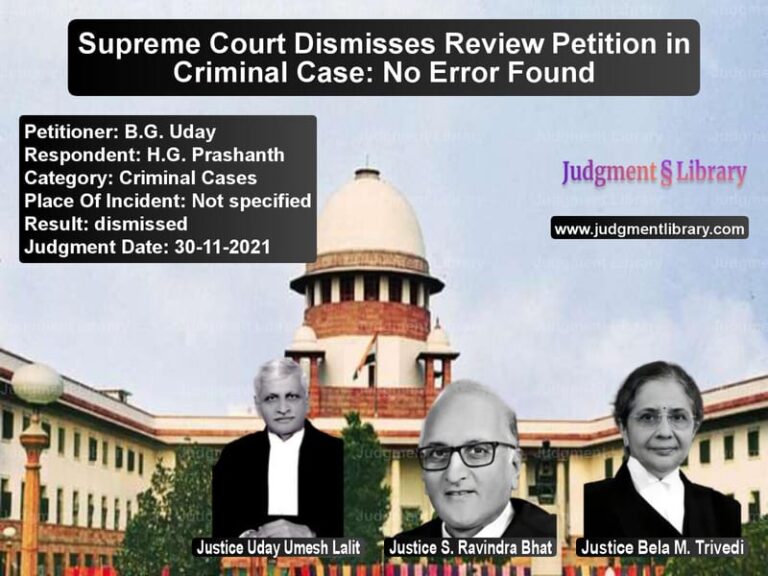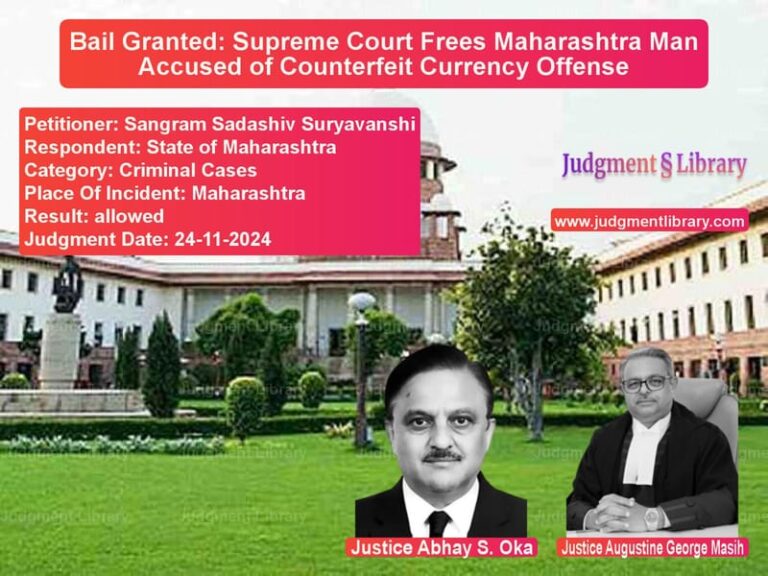Railway Accident Compensation: Supreme Court Grants Relief to Family of Passenger Who Fell from Train
The Supreme Court of India, in the case of Kamukayi & Ors. vs. Union of India & Ors., addressed a compensation claim under the Railways Act, 1989, for the accidental death of a passenger. The Court ruled in favor of the appellants, overturning decisions of the Railway Claims Tribunal and the Madras High Court, which had denied compensation on the grounds that the deceased was not a bona fide passenger.
Background of the Case
The case involved the death of Muchamy @ Muthusamy, who fell from a moving train on September 27, 2014. He was traveling from Lalapettai to Karur for medical treatment. His son, Manikandan, had purchased a ticket for him at Lalapettai Railway Station. The deceased reportedly fell between the platform and the railway track due to overcrowding and jerking of the train near Mahadanapuram Railway Station.
The family of the deceased filed a compensation claim before the Railway Claims Tribunal in Chennai, seeking Rs. 4,00,000 with 12% interest per annum. However, the Tribunal dismissed the claim, citing the absence of a recovered train ticket and questioning whether the incident was an ‘untoward incident’ under the Railways Act.
Legal Dispute and High Court Ruling
The appellants challenged the Tribunal’s decision in the Madras High Court, which upheld the Tribunal’s findings. The High Court reasoned that since no ticket was found on the deceased’s body, he could not be classified as a ‘bona fide passenger,’ and the claim for compensation was rejected.
Arguments Before the Supreme Court
Appellants’ Arguments
The appellants, represented by Senior Counsel, contended that:
- The deceased had purchased a valid train ticket, and his son had witnessed him boarding the train.
- The absence of a ticket from the deceased’s body was not conclusive proof that he was not a bona fide passenger.
- The incident qualified as an ‘untoward incident’ under Section 123(c)(2) of the Railways Act, making the Railway Administration liable for compensation.
- The Tribunal and High Court erred in requiring the appellants to prove the deceased’s bona fide passenger status beyond reasonable doubt.
Respondents’ Arguments
The Union of India and Southern Railway defended the Tribunal’s decision, arguing that:
- The burden of proof rested on the claimants to establish that the deceased was a bona fide passenger.
- No train ticket was recovered from the deceased’s possession, which indicated he may have been traveling without one.
- The nature of injuries suggested that the deceased’s death was not caused by falling from the train.
Supreme Court’s Observations
Legal Framework for Compensation
The Court examined Sections 123(c) and 124A of the Railways Act, which define ‘untoward incidents’ and mandate compensation for passengers involved in such incidents, irrespective of fault or negligence on the part of the Railways.
Burden of Proof and Bona Fide Passenger Status
The Supreme Court referred to its ruling in Union of India vs. Rina Devi (2019), which held that:
- A claimant is not required to prove that the deceased had a ticket if there is circumstantial evidence supporting their claim.
- The burden of disproving passenger status shifts to the Railways once a prima facie case is made.
The Court noted that in this case:
- The deceased’s son had testified to purchasing a ticket for his father.
- The FIR and inquest report supported the claim that the deceased fell from the train.
- The final police report concluded that the incident was an accident.
Railway’s Failure to Disprove the Claim
The Court found that the Railway Administration had not provided any substantive evidence to counter the appellants’ claims. It emphasized that the absence of a ticket from the deceased’s body was not sufficient to deny compensation.
Final Judgment
The Supreme Court set aside the judgments of the Tribunal and the High Court, ruling that:
- The deceased was a bona fide passenger.
- The incident qualified as an ‘untoward incident’ under Section 123(c)(2) of the Railways Act.
- The appellants were entitled to compensation.
- Compensation of Rs. 4,00,000 with 7% interest per annum was awarded, with a provision that if the total amount with interest fell below Rs. 8,00,000, the appellants would receive Rs. 8,00,000.
- The amount was to be paid within eight weeks.
Key Takeaways
- Legal Protection for Railway Passengers: The ruling strengthens the rights of passengers and their families to claim compensation under the Railways Act.
- Burden of Proof on Railways: The decision reaffirms that once a prima facie case is made, the Railways must disprove claims rather than relying on technicalities like the absence of a ticket.
- Recognition of Circumstantial Evidence: Eyewitness testimony and police reports can be sufficient to establish bona fide passenger status.
- Compensation Calculation: The Court ensured that victims’ families receive fair compensation, taking into account amendments to the Railway Accidents and Untoward Incidents (Compensation) Rules.
Conclusion
The Supreme Court’s ruling in this case sets an important precedent in railway accident compensation claims. It reinforces that procedural hurdles should not deny justice to victims’ families and clarifies the legal obligations of the Railway Administration in cases of untoward incidents.
Petitioner Name: Kamukayi & Ors..Respondent Name: Union of India & Ors..Judgment By: Justice Surya Kant, Justice J.K. Maheshwari.Place Of Incident: Lalapettai, Tamil Nadu.Judgment Date: 16-05-2023.
Don’t miss out on the full details! Download the complete judgment in PDF format below and gain valuable insights instantly!
Download Judgment: kamukayi-&-ors.-vs-union-of-india-&-ors-supreme-court-of-india-judgment-dated-16-05-2023.pdf
Directly Download Judgment: Directly download this Judgment
See all petitions in Compensation Disputes
See all petitions in Negligence Claims
See all petitions in Motor Vehicle Act
See all petitions in Judgment by Surya Kant
See all petitions in Judgment by J.K. Maheshwari
See all petitions in allowed
See all petitions in Modified
See all petitions in supreme court of India judgments May 2023
See all petitions in 2023 judgments
See all posts in Accident Cases Category
See all allowed petitions in Accident Cases Category
See all Dismissed petitions in Accident Cases Category
See all partially allowed petitions in Accident Cases Category







